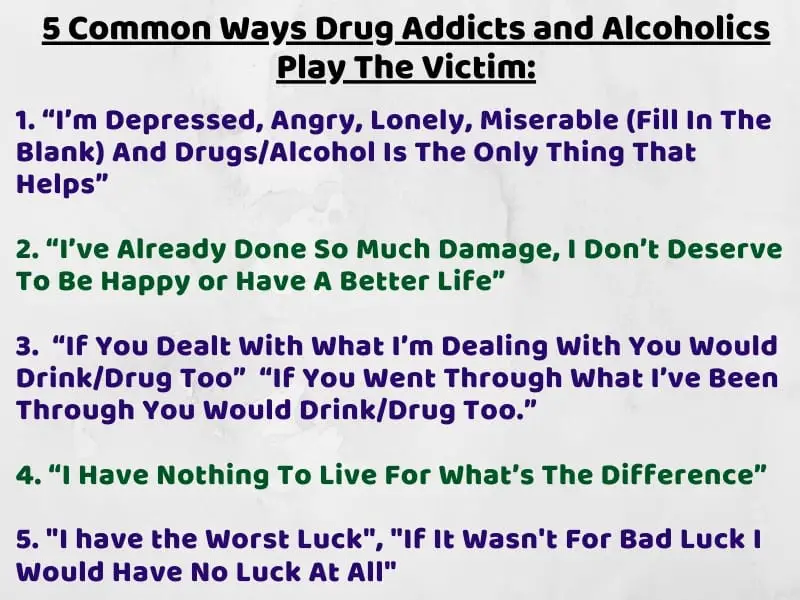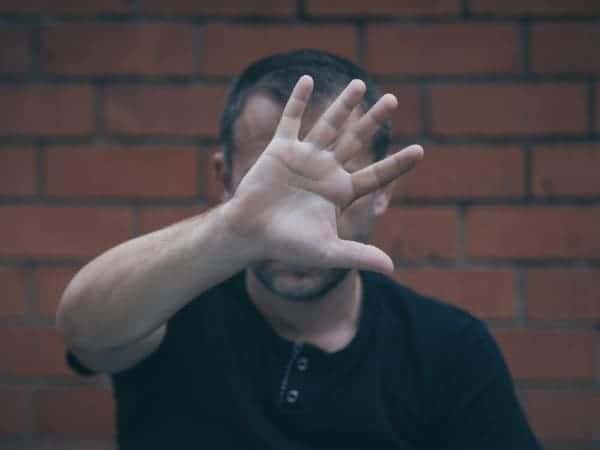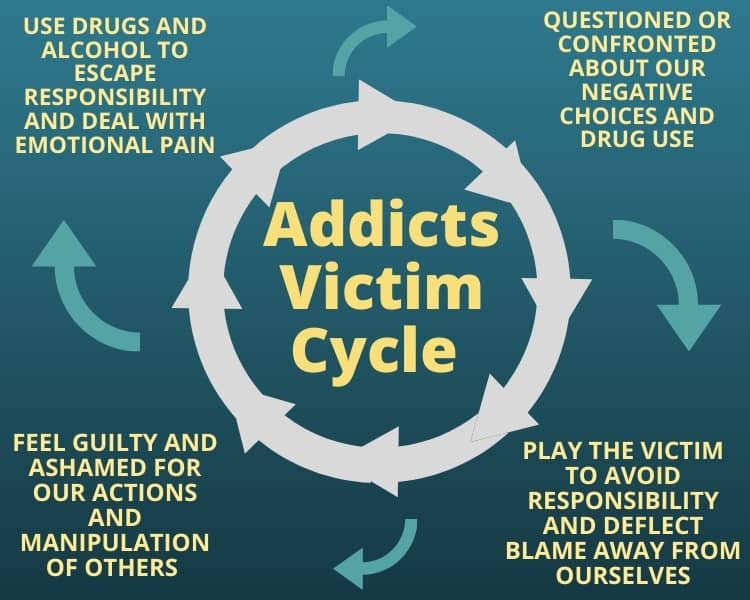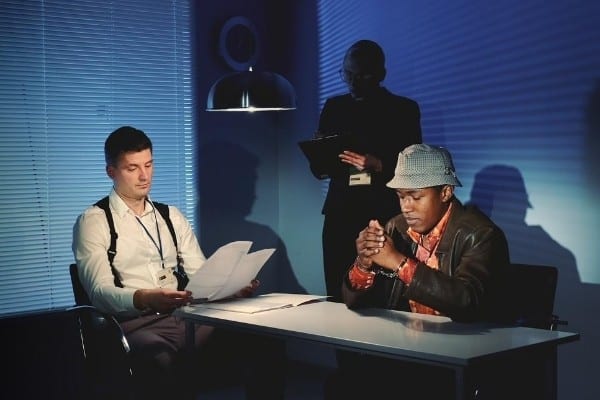“It’s not my fault, Poor me, I can’t catch a break”. This may sound harsh but it’s the common thought process of many alcoholics and addicts. They may not come right out and say they’re a victim but their actions and general demeanor show otherwise. Having a victim mentality is not unique to addiction. People from all walks of life play the victim, often times when it suits their needs. Just to be clear I’m not talking about someone who has been legitimately assaulted or victimized. This is about people specifically addicts (myself included) who play the victim to avoid responsibility for our actions. On a deeper level, many people play the victim to save face and cover for their mistakes. It’s hard to look at another person and say “I’m sorry, this is my fault, I take responsibility”.
Certain individuals are more prone than others to naturally gravitate to the victim mentality. This may be due to a lack of self-esteem, their upbringing, or turbulent childhood. During active addiction these drug users will feel inclined to have the attitude “I can’t catch a break, lives not fair, I was dealt a bad hand”. So Why Do Drug Addicts and Alcoholics Seem To Always Play The Victim Card?

Why Do Addicts and Alcoholics Play The Victim?
Many people play the victim card, especially those in active addiction because it deflects blame and responsibility onto someone or something else. When an addict is confronted about their actions and behaviors, their brain instinctively looks for the path of least resistance. For some people, the victim mentality has become an automatic response from years of practice. The addict has unconsciously become a master at avoiding mental and emotional pain. They have created and honed their ability to play the victim in order to justify their continued negative choices. When an addict is being questioned about their negative lifestyle, playing the victim is a defense tactic. They’re attempting to turn the other person’s questions and accusations into sympathy or empathy for their struggle.
This deflecting and justifying through playing the victim is designed to convince themselves, family, and friends that their drug use is warranted. “Don’t get mad at me, feel sorry for me”. If I admit that I have been making poor choices surrounding my drug and alcohol use, then I’m forced to take personal responsibility, something addicts and alcoholics avoid at all costs. They’re trying to find a way to explain away their negative choices while keeping the backdoor open for continued drug and alcohol use.
Here are some of the most common ways addicts and alcoholics will play the victim. Often this is an attempt to deflect blame away from themselves onto someone or something else:

Here is a full list of the 21 most common excuses and justifications addicts and alcoholics use.
I used every one of these lines during my active addiction. Depending on the situation I would use one of these lines in an attempt to soften the blow of facing down responsibility for my actions and behaviors. When my football coaches heard about me drinking and using drugs they questioned me. Part unconsciously and part concisely I turned the conversation from them saying “What the hell are you thinking, your 17 and your drinking this much and using cocaine” to ” ok so you’re going through some personal struggles let’s see if we can find some ways to get you help”. Boom I was home free. I turned their anger and questioning into concern and sympathy.
That may sound like a good ending, the teen gets help for his drinking and drug use, but it wasn’t. I was manipulating them the whole time in order to get this outcome. When they sent me to AA meetings and a drug counselor I did the same to them. I told them what they wanted to hear. After 3 months I was graduating from an outpatient rehab. The problem was, during this entire period I was drinking and getting high just as much as before. But I knew if I could keep people feeling sorry for me it would buy me more time to keep doing what I wanted.
Unlikely Truth During Addiction
Think about that same situation, if I would have taken full responsibility. “You guys are right, I have been doing cocaine on weekends, drinking too much alcohol, and smoking a lot of weed. I don’t really have any good reason why I am doing all this. I give into peer pressure easily and want to escape reality with drugs and alcohol. It was my drugs and my choice to do drugs.”
Reading that sounds great, very mature, and honest, but for someone who’s in that situation at the time, our brain is seeking any and every way to avoid pain and suffering. Admitting the truth will equal pain and suffering because we will be admitting to our problem and admitting we need to take massive action to work on and correct the negative choices and behaviors. We will be admitting we need to change and humans don’t like change, it scares many of us. 
Addicts And Alcoholics Use The Subtle Victim Mentality
It’s common for us to think someone is playing the victim when they say things like “No one is dealing with as much trauma as I am” or, “You will never understand how bad things are for me” but there are dozens of other more subtle ways addicts play the victim card. My favorite is “I have the worst luck”. I used every one of these lines during active addiction and still catch myself using them on occasion.
When someone is in active addiction they are typically making dozens of negative choices on a daily basis. Most addicts are behind on their finances, having trouble at work or trouble finding and keeping a job, having relationship issues with their family, friends, or significant other, legal issues, health issues, and emotional problems. When you look at all those things it’s easy to say, “wow I just can’t catch a break.”
In reality, it has nothing to do with luck or catching a break. Many of those issues wouldn’t even exist if it wasn’t for drinking and drug use. As an addict in active addiction, we run and use drugs or alcohol to cope with our problems. What we fail to realize is the drug and alcohol use is making any and every problem in our lives substantially worse. Then we complain about how bad those problems have gotten because it’s easier to complain than to face them.

Addicts Have To Self-Justify
When someone says “If you went through what I went thought you would drink too”. In the addict’s mind, they are trying to convince and justify their negative behaviors to the other person. The truth is they’re really trying to convince themselves.
Most addicts and alcoholics know that they’re destroying their lives, and the human brain doesn’t like uncomfortably. So we say these things to try and convince ourselves that it’s ok to keep getting high.
We can see and hear the victim justifications being used in many areas of life. People will skip a workout and eat ice cream because they “had a tough day”. I have done this and still do this all the time. When I tell myself “wow I’m beat from work, I think I need a day off from working out, and a cheeseburger, I deserve it after a long hard day at work”. I’m not saying this to convince others I’m trying to justify it to my own brain. If I tell myself the truth ” I am feeling super lazy today and I’m gonna skip my workout for the 3rd straight day” then I will feel guilty and ashamed.

Damage Justification During Active Addiction
The poor me victim mentality is also used by addicts and alcoholics as a defense mechanism to cover up for all the people they’re hurting on a daily basis. I knew I was hurting everyone around me during my addiction, but playing the victim it allowed me to cope with and justify these actions. We addicts see the damage we are causing our loved ones. Sitting and facing the responsibility of our actions is a burden many of us, (myself included) could not deal with.
Whenever I would sit and contemplate the effects of my actions is was excruciatingly painful. I jumped to being the victim to help ease the pain and deflect responsibility in my own head.
Changing Our Mindset
Playing the victim is always a recipe for failure. Everybody has struggled in life and when we try to make it out as if we are a super unlucky person then that’s what our brain will think. If I assume and think I’m a victim then that’s how things will play out for me. I will see myself as a victim in every situation in life and never take responsibility and conquer my demons and fears.
In order to recover from addiction, we need to take responsibility for our actions. I’m not saying every addict is 100% responsible for everything that has ever happened to them, but they need to learn to accept accountability for the things they did play a part in. This is a huge first step towards recovery.
Once in recovery rebuilding our lives is a daunting task but can be done. It can be very easy to slip back into this victim mentality even when we are sober. This will never help us rebuild and get ahead. But if it happens it’s ok we just need to be conscious of it and work to change our mentality.


